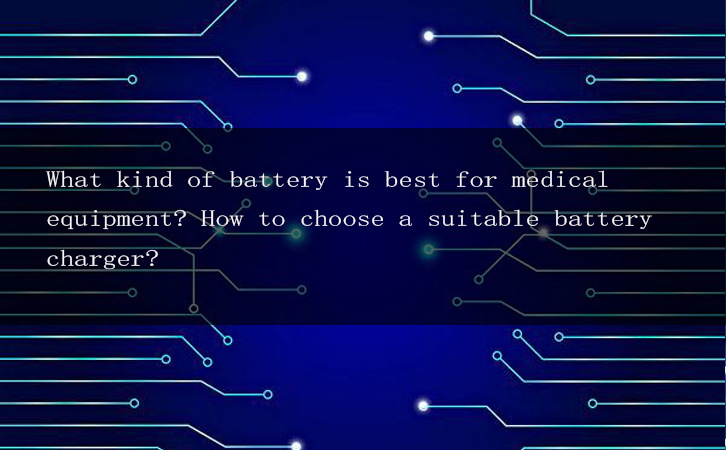Information Center
What kind of battery is best for medical equipment? How to choose a suitable battery charger?
Published:2024-10-29 15:03:51 Author:admin Views:21
The choice of batteries for medical equipment varies and largely depends on the specific needs and usage scenarios of the devices. Below is an analysis of several common types of batteries used in medical equipment:
Nickel-Metal Hydride (NiMH) Batteries: They have high capacity and energy density, providing relatively long-lasting power support, and have a relatively low self-discharge rate. Additionally, NiMH batteries can be recharged cyclically, reducing the frequency of battery replacement and being environmentally friendly. They are suitable for some portable medical monitoring devices, such as glucometers, blood pressure monitors, and small rehabilitation devices like low-frequency therapy machines.
Lithium-Ion Batteries (Li-ion): They have high energy density, lightweight, small size, and no memory effect, making them suitable for high-end portable medical diagnostic equipment, such as portable ultrasound diagnostic units and electrocardiographs. Meanwhile, the lightweight nature of Li-ion batteries also suits wearable medical devices, like smart bracelets and watches. However, Li-ion batteries have high charging requirements and need dedicated chargers; overcharging can easily lead to safety issues.
Lithium Polymer Batteries (LiPo): Compared to Li-ion batteries, LiPo batteries offer better safety under overcharge, over-discharge, and short-circuit conditions. They can be made into various shapes to fit the design requirements of different medical devices. Additionally, their lightweight nature helps reduce the overall weight of medical equipment, enhancing portability. They are suitable for implantable medical devices, such as pacemakers and insulin pumps, as well as small portable medical devices like handheld stethoscopes and electronic thermometers.
Lead-Acid Batteries: They are technologically mature, relatively inexpensive, have stable voltage, and high reliability, making them suitable for some large medical equipment, such as hospital beds and electric wheelchairs. Meanwhile, the reliability of lead-acid batteries also makes them applicable in emergency medical equipment, like emergency lighting and resuscitators. However, lead-acid batteries are bulky, have low energy density, and have a relatively short lifespan.
When selecting a compatible battery charger, the following factors need to be considered:
Battery Type: Choose a charger according to the type of battery selected (e.g., NiMH, Li-ion, lead-acid, etc.). Different types of batteries have different charging characteristics and requirements, so chargers cannot be mixed.
Battery Parameters: These include the battery's voltage and capacity. The output voltage of the charger must match the rated voltage of the battery to avoid overcharging or undercharging. Additionally, the output current of the charger should also be compatible with the battery's capacity to ensure charging efficiency and battery lifespan.
Quality and Brand: Choose chargers from well-known brands with reliable quality to ensure the charger's safety and stability. High-quality chargers offer better circuit design, electronic component selection, and safety protection.
Charging Interface: Ensure that the charger's interface is compatible with the charging interface of the medical equipment to avoid charging issues.
In summary, the choice of which battery is best for medical equipment and how to select a compatible battery charger requires comprehensive consideration based on the specific needs and usage scenarios of the devices. During the selection process, attention should be paid to the performance characteristics of the battery, charger compatibility, quality, and brand to ensure the normal operation of medical equipment and the battery's lifespan.
SHENZHEN GREEN DIGITAL POWER TECH CO., LTD is a professional battery charger manufacturer that can customize Lithium ion Battery Charger, LiFePO4 Battery Charger, AGM Battery Charge, NIMH Battery Charger and other charger products according to customer needs.
IntroductionGolf carts serve as vital transportation tools on golf courses, and their performance and reliability are crucial for enhancing player experience an···
The battery pack is the heart of a golf cart, silently powering every acceleration and climb on the green. However, battery degradation often goes unnoticed, mu···
The battery pack is the heart of a golf cart’s power system, yet maintaining it has long been a challenge for technicians. Traditional troubleshooting methods—···
For golf course managers, ensuring smooth and efficient operations is crucial for providing a memorable experience for golfers and maintaining the reputation of···





